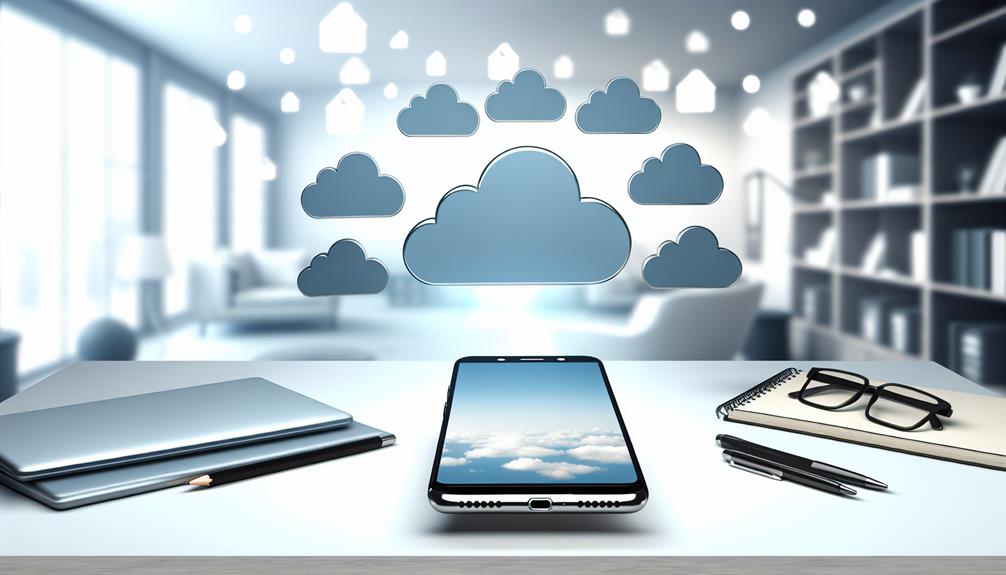If you're finding yourself constantly running out of storage on your iPhone, you're not alone. There are several ways to effectively manage and expand your storage options, whether it's through upgrading your iCloud plan or utilizing alternative cloud services. You might also consider optimizing your local storage by offloading unused apps and adjusting photo settings. But before you make a decision, it's crucial to evaluate which approach best suits your needs, especially when it comes to larger data requirements. Let's explore these options further to help you make an informed choice.
Check Your Current Storage
Checking your current storage is essential before considering an upgrade. Knowing how much space you have can help you make informed decisions about your storage needs. To check your iPhone's storage, go to Settings, tap on General, and then select iPhone Storage. Here, you'll see a breakdown of your used and available storage, along with a list of apps and how much space each one consumes.
Conducting a storage analysis is a smart first step. With this analysis, you can identify your usage patterns—what apps are taking up the most space and whether you really need them. You'll often find that apps like Photos, Music, and Videos can quickly eat up your storage. If you've got a lot of unused apps or large files you don't need, now's the perfect time to delete them.
Additionally, take advantage of the recommendations Apple provides in the iPhone Storage menu. These suggestions can help you optimize your storage, such as offloading unused apps or reviewing large attachments in Messages. This proactive approach lets you assess whether your current storage is sufficient or if you truly need to look into an upgrade.
Upgrade Icloud Storage Plan
Considering an upgrade to your iCloud storage plan can greatly enhance your iPhone experience. With various iCloud pricing options available, you can choose a plan that suits your needs best. Apple's storage tiers range from 50GB to 2TB, allowing you to scale your storage as your requirements grow.
Here are some upgrade benefits you can enjoy:
- Seamless backups of your photos, videos, and documents.
- Family sharing options to let your loved ones share storage and save money together.
- Enhanced data security to keep your important files safe and accessible.
- Plan flexibility that allows you to adjust your storage as your needs change.
When exploring plan comparisons, consider how much storage you currently use versus what each plan offers. If you find yourself running out of space frequently, a larger plan might save you the hassle of managing files. Plus, with renewal reminders, you won't have to worry about unexpected charges.
Upgrading your iCloud storage not only supports your daily usage but also provides peace of mind. You'll have the freedom to store more files without the stress of constantly deleting old ones. So, take a moment to assess your storage needs, weigh the benefits, and make the switch. Your iPhone will thank you, and you'll enjoy a smoother, more efficient experience!
Use Alternative Cloud Services

Exploring alternative cloud services can be a smart move if you need more storage options for your iPhone. While iCloud is a popular choice, several other cloud services can provide you with the extra space you're looking for, often at competitive prices.
When you delve into cloud service comparisons, you'll find that options like Google Drive, Dropbox, and OneDrive each offer unique features. For instance, Google Drive gives you 15 GB of free storage, which is great for light users. It also integrates seamlessly with Google's suite of apps, making file access and sharing easy. Dropbox is well-known for its user-friendly interface, while OneDrive is a solid option if you're already using Microsoft 365.
Beyond just storage capacity, understanding the cloud storage benefits is vital. Many of these services allow you to easily share files with others, collaborate in real-time, and access your data from multiple devices. This flexibility can enhance your productivity and make managing your files simpler.
Additionally, consider the security features offered by these services. Most reputable cloud providers use strong encryption methods to protect your data, which is essential for keeping your personal information safe.
Ultimately, exploring these alternatives not only helps you find the right storage solution for your needs but can also save you money. So, take the time to assess your options and choose a cloud service that fits your lifestyle best.
Manage Local Storage
While cloud services can expand your storage options, managing local storage on your iPhone is just as important. Effective storage management helps you keep your device running smoothly, ensuring that you have room for the apps, photos, and files you want. By organizing your data thoughtfully, you can maximize your local storage without needing to purchase more.
Here are some practical tips to help you manage your iPhone's local storage effectively:
- Delete Unused Apps: Go through your apps and remove those you rarely use. Every app takes up valuable space.
- Clear Cache: Regularly clear the cache of your frequently used apps, like browsers and social media, to free up storage.
- Organize Photos and Videos: Transfer photos and videos to your computer or cloud storage, or use optimized settings to reduce their size on your device.
- Manage Messages: Delete old text messages and iMessage attachments. They can accumulate over time and consume a significant amount of storage.
Offload Unused Apps

If you're running low on storage, offloading unused apps can free up space without losing your data. First, you'll want to identify which apps you rarely use. Then, we'll walk you through the steps to offload these apps easily.
Identify Unused Applications
To free up valuable space on your iPhone, start by identifying and offloading unused applications. Conducting a storage analysis can help you pinpoint which apps you rarely use, making it easier to determine what to remove. Here are some indicators to take into account when evaluating your app usage:
- Apps you haven't opened in months: If an app hasn't been used in a long time, it might be a candidate for offloading.
- Apps with high storage consumption: Some apps take up more space than you realize, especially games or video editing tools.
- Redundant apps: Reflect on if you have multiple apps serving similar purposes, like several photo editing tools.
- Apps with little to no functionality: If an app doesn't offer much value or you have alternatives, it's time to let it go.
Offloading Process Steps
When you're ready to free up space by offloading unused apps, the process is straightforward and user-friendly. Offloading is a key part of effective app management and helps with storage optimization without losing your data.
To start, go to your iPhone's Settings. Scroll down and select "General," then tap on "iPhone Storage." Here, you'll see a list of apps and how much space they take. Look for the apps you identified as unused. Tap on any app, and you'll see an option to "Offload App." Confirm your choice, and the app will be offloaded, freeing up storage while keeping its data intact.
You can also enable automatic offloading. In the "iPhone Storage" section, scroll down to find "Enable" next to "Offload Unused Apps." This handy feature guarantees your device automatically offloads apps you don't use regularly when storage is low.
With these steps, you'll efficiently manage your apps and optimize your iPhone's storage, making room for new memories or that must-have app.
Optimize Photo and Video Settings
To make the most of your iPhone's storage, it's crucial to optimize your photo and video settings. Start by adjusting your camera settings to capture images in a more storage-friendly format. Additionally, utilizing iCloud Photos can help you store your media in the cloud, freeing up space on your device.
Adjust Camera Settings
Before snapping your next photo or video, it's important to adjust your camera settings to guarantee you're not using more storage than necessary. High camera resolution and certain photo formats can quickly eat up your available space. By tweaking these settings, you can capture stunning memories without the storage headache.
Here are a few adjustments you should consider:
- Lower Camera Resolution: Opt for a lower resolution if you're just taking casual shots. This can greatly save space.
- Switch Photo Formats: Use HEIF instead of JPEG. HEIF offers high-quality images at about half the file size.
- Limit Video Quality: If you're recording videos, choose a lower quality setting, like 720p instead of 1080p.
- Disable Live Photos: While fun, Live Photos take up extra space. Disable this feature for standard photos.
Utilize Icloud Photos
Using iCloud Photos can be a game changer for managing your storage, especially if you're capturing lots of memories. By enabling this feature, you can automatically back up your photos and videos to the cloud, freeing up valuable space on your iPhone. One of the key iCloud benefits is that it allows you to optimize photo organization, which means you can access all your images without cluttering your device.
To get started, go to Settings, tap on your name, then select iCloud and Photos. Turn on "iCloud Photos" and choose "Optimize iPhone Storage." This setting keeps smaller, device-sized versions of your photos on your iPhone while storing the full-resolution versions in iCloud. It's an efficient way to manage your media without sacrificing quality.
Additionally, consider reviewing your albums regularly. Delete any duplicates or unwanted images, which not only helps with organization but also maximizes your storage savings. With iCloud Photos, you can enjoy peace of mind knowing your memories are safely stored, while keeping your iPhone's storage in check. This way, you'll always have room for new moments!
Consider External Storage Options

When you're running low on storage, considering external options can be a game-changer. External storage not only helps with storage management but also enhances your data transfer capabilities, allowing you to keep your iPhone running smoothly. Here are some practical external storage solutions you might want to explore:
- Portable drives: Compact and easy to carry, these drives can store large amounts of data for quick access.
- Wireless options: Devices that back up your files without the need for cables, offering convenience and ease of use.
- Cloud backups: Services like Google Drive or Dropbox provide a way to store your files online, accessible from anywhere.
- Mobile storage: Gadgets that connect directly to your iPhone, making file organization and transfer seamless.
Using these external storage options can markedly reduce the burden on your iPhone's internal storage. You'll be able to free up space for essential apps and photos while keeping your data safe. Plus, many of these devices come with a cost comparison that lets you choose the most budget-friendly option without sacrificing quality.
Don't forget to assess how each option fits into your lifestyle. Whether you need a quick data transfer or a long-term cloud backup, there's an external storage solution that can meet your needs. By integrating these strategies, you can guarantee your iPhone stays efficient and organized, allowing you to enjoy your device to the fullest.
Frequently Asked Questions
Can I Buy Storage Directly From My Iphone Without a Computer?
Yes, you can buy storage directly from your iPhone without a computer. Just go to Settings, tap on your name, then iCloud. Check iCloud pricing and choose a storage plan that fits your needs.
Is There a Way to See What Apps Are Using the Most Storage?
To uncover which apps are hogging your space, head to Settings. Under Storage Management, you'll find a list, helping you with app optimization. Keep your device light, and let clutter fade away!
Will Buying More Icloud Storage Affect My Iphone's Performance?
Buying more iCloud storage won't directly impact your iPhone's performance. However, it offers benefits like backing up data and freeing up local space, which can indirectly enhance your device's overall efficiency and functionality.
Can I Share My Icloud Storage Plan With Family Members?
Isn't it great to know you can share your iCloud storage? With a family plan, you can easily invite family members to join in on iCloud sharing, maximizing your storage benefits together.
How Often Can I Upgrade or Downgrade My Icloud Storage Plan?
You can upgrade or downgrade your iCloud storage plan anytime you want. iCloud pricing is flexible, allowing you to adjust your storage features based on your needs without any long-term commitments or penalties.
Conclusion
In a world where digital treasures abound, don't let storage limitations dim your shine. By upgrading your iCloud plan or exploring alternative cloud services, you can keep your memories safe and accessible. Manage your local storage wisely—offload unused apps and optimize your photo settings to create space for new adventures. If you need more flexibility, consider external storage options. With these steps, you'll release the full potential of your iPhone, allowing your digital life to flourish.






Leave a Reply